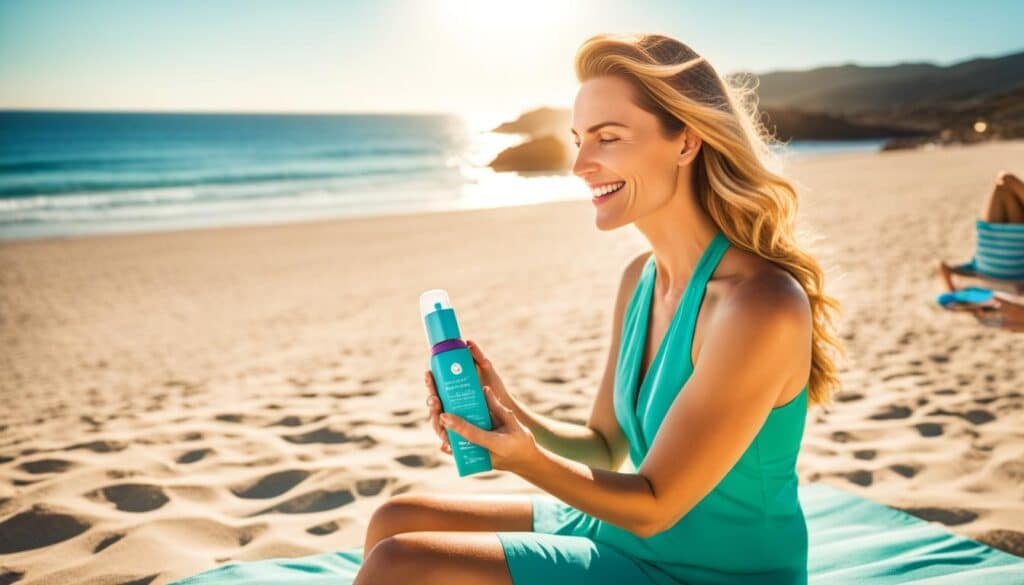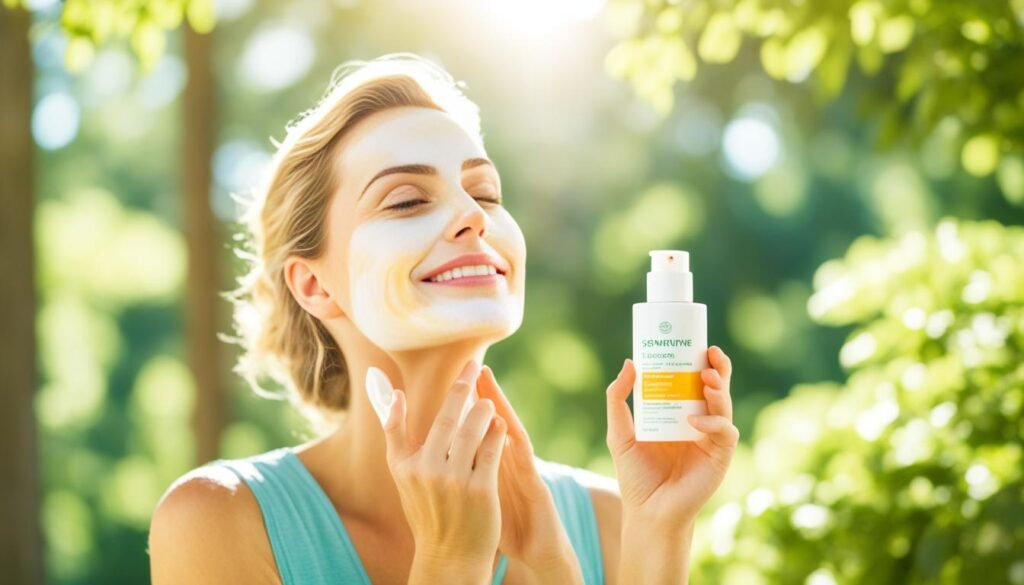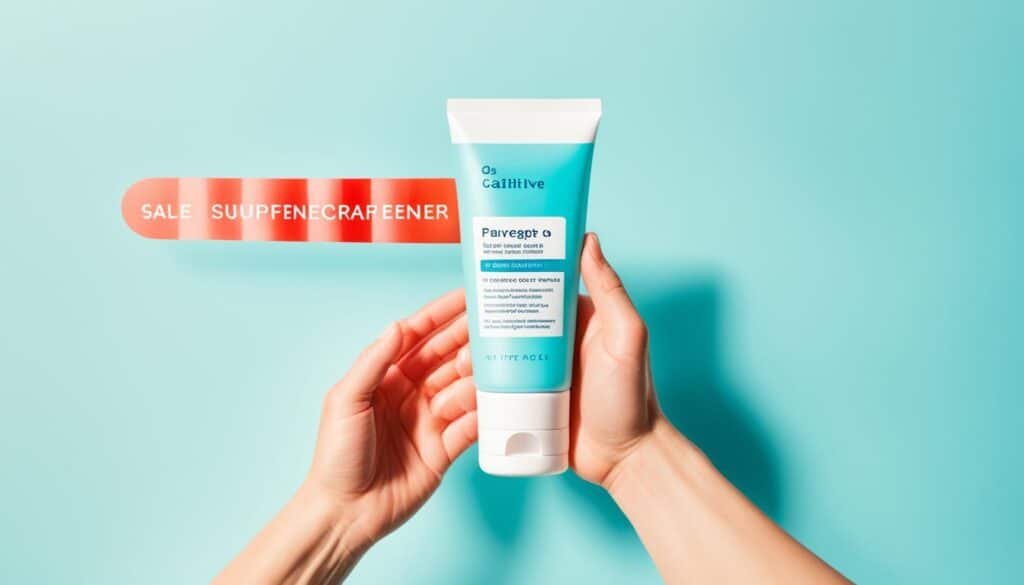Protecting your skin from the sun’s harmful rays is crucial, especially for those with sensitive complexions. Finding the right sunscreen can be a challenge, but Sephora customers have identified some excellent options that cater to sensitive skin types. Mineral-based, fragrance-free, hypoallergenic, and non-comedogenic sunscreens have emerged as top choices for those seeking gentle, non-irritating sun protection.
These sunscreens are formulated to be lightweight, hydrating, and free of ingredients that can cause irritation or breakouts. By opting for these sensitive-skin-friendly formulas, individuals with delicate complexions can shield their skin from the sun’s damaging effects without worrying about adverse reactions.
Key Takeaways
- Mineral-based sunscreens are gentler on sensitive skin compared to chemical sunscreens.
- Fragrance-free and hypoallergenic formulas minimize the risk of irritation and allergic reactions.
- Non-comedogenic and oil-free sunscreens are less likely to clog pores or cause breakouts.
- Lightweight, hydrating sunscreens are more comfortable for daily wear on sensitive skin.
- Broad spectrum protection from both UVA and UVB rays is important for comprehensive sun defense.
What is Sunscreen For Sensitive Skin?
Sunscreen for sensitive skin typically refers to formulas that are gentle, non-irritating, and less likely to cause adverse reactions for those with easily irritated complexions. These sunscreens for sensitive skin often feature mineral-based active ingredients like zinc oxide or titanium dioxide, which provide a physical barrier to reflect and scatter UV rays rather than absorbing them like chemical sunscreens.
Gentle Mineral-Based Formulas
Mineral-based sunscreens are a preferred choice for those with sensitive skin as they are generally more gentle and non-irritating compared to chemical-based sunscreens. These formulas create a physical shield to protect the skin from harmful UV rays without causing potential irritation or sensitivity.
Fragrance-Free and Hypoallergenic
Fragrance-free and hypoallergenic sunscreen formulas are also common options for sensitive skin types. These products minimize the risk of allergic reactions or irritation, making them a safer choice for those with delicate complexions.
Non-Comedogenic and Oil-Free Options
Additionally, non-comedogenic and oil-free sunscreen options are preferred for sensitive and acne-prone skin types. These formulas are less likely to clog pores or cause breakouts, providing gentle, lightweight, and non-irritating daily sun protection.
Why Use Sunscreen For Sensitive Skin

Using sunscreen is crucial for sensitive skin types, as it helps protect the skin from the harmful effects of ultraviolet (UV) radiation. UV exposure can lead to various skin issues for those with sensitive complexions, including inflammation, redness, and exacerbation of existing conditions like eczema or rosacea. Mineral-based sunscreens create a physical barrier to block and reflect UV rays, preventing direct damage to the skin’s delicate surface.
Protect Against UV Damage
Exposure to UV rays can have detrimental effects on sensitive skin, causing inflammation, discoloration, and even long-term damage. Mineral-based sunscreen for sensitive skin forms a protective shield to reflect and scatter these harmful rays, shielding the skin from the sun’s UV damage.
Prevent Irritation and Redness
Sensitive skin is more prone to irritation and redness from certain sunscreen ingredients. Using formulas specifically designed for sensitive skin can help minimize the risk of adverse reactions and maintain skin health and comfort.
Sunscreen For Sensitive Skin

Sunscreen specifically formulated for sensitive skin types is an essential product to have in one’s skincare routine. These sunscreens are designed to provide broad-spectrum protection from both UVA and UVB rays while minimizing the risk of irritation, redness, or other adverse reactions that can occur with regular sunscreen use for those with delicate complexions. By choosing mineral-based, gentle, and non-comedogenic sunscreen formulas, individuals with sensitive skin can safely and effectively shield their skin from sun damage and maintain optimal skin health.
Top Mineral Sunscreens for Sensitive Skin

For sensitive skin types, mineral-based sunscreens are often the preferred choice as they tend to be gentler and less irritating than chemical sunscreens. Some top picks for mineral sunscreens suitable for sensitive skin include:
EltaMD UV Clear Face Sunscreen
This oil-free, mineral sunscreen is formulated with zinc oxide to provide broad spectrum SPF 46 protection. It is non-comedogenic, non-irritating, and dermatologist-recommended for sensitive skin types.
La Roche Posay Anthelios Mineral Zinc Oxide SPF 50
Featuring mineral zinc oxide as the active ingredient, this SPF 50 sunscreen offers broad spectrum protection while being gentle on sensitive skin. It is non-greasy and leaves a natural, non-shiny finish.
MDSolarSciences Mineral Crème SPF 50
This mineral-based sunscreen provides SPF 50 broad spectrum protection without irritating sensitive skin. The formula is non-comedogenic, fragrance-free, and dermatologist-recommended.
Choosing the Right Sunscreen Formulation

When selecting a mineral sunscreen for sensitive skin, it’s important to look for specific formulation features that cater to delicate complexions. Mineral-based sunscreens containing active ingredients like zinc oxide or titanium dioxide are generally less irritating than chemical sunscreens, as they provide a physical barrier to reflect and scatter UV rays rather than absorbing them into the skin.
Look for Zinc Oxide or Titanium Dioxide
Mineral sunscreens formulated with zinc oxide or titanium dioxide are often the preferred choice for sensitive skin types. These physical blockers create a shield on the skin’s surface, effectively shielding against both UVA and UVB rays without the need for chemical absorption.
Opt for Moisturizing Ingredients
When selecting a mineral sunscreen for sensitive skin, look for formulas that incorporate moisturizing ingredients like hyaluronic acid or glycerin. These additions can help hydrate and soothe the skin, preventing dryness or tightness that can sometimes accompany mineral sunscreen use.
Consider SPF Level and Broad Spectrum Protection
Ensure the mineral sunscreen you choose provides adequate SPF level (at least SPF 30) and broad spectrum protection to safeguard your skin from both UVA and UVB radiation. This comprehensive coverage is crucial for maintaining skin health and preventing sun damage, especially for those with sensitive complexions.
Sunscreen Application Tips

Proper sunscreen application is key to ensuring your sensitive skin receives effective and consistent sun protection. Experts recommend applying your sunscreen generously and evenly to all exposed areas of your skin, including often-overlooked spots like your ears, neck, and lips.
Apply Generously and Evenly
To achieve adequate sun protection, it’s important to apply a liberal amount of sunscreen and ensure it’s distributed evenly across your skin. This helps create a continuous barrier to shield your sensitive skin from harmful sun exposure.
Reapply Every Two Hours
Reapplying your sunscreen every two hours, or more frequently if you’re swimming or sweating, is crucial to maintaining the necessary level of sun protection. This helps replenish the sunscreen and ensures your skin stays shielded throughout the day.
Use Sunscreen Alongside Other Sun Protection Measures
While sunscreen is essential for protecting your sensitive skin, it’s also important to incorporate other sun-safe practices, such as wearing protective clothing, seeking shade, and avoiding peak sun hours, to maximize your overall sun protection.
Ingredients to Avoid for Sensitive Skin

When selecting a sunscreen for sensitive skin, it’s important to avoid certain ingredients that can potentially cause irritation or adverse reactions. Chemical sunscreen filters, such as oxybenzone and avobenzone, are known to be more irritating to some individuals with sensitive complexions. These ingredients are absorbed into the skin and may trigger sensitivity, redness, or inflammation.
Chemical Sunscreen Filters
The use of chemical sunscreen filters can be problematic for those with sensitive skin. These ingredients, including oxybenzone and avobenzone, are designed to absorb UV radiation, but they can also be absorbed into the skin, leading to potential irritation and skin sensitivity. Individuals with delicate complexions may experience increased redness or other adverse reactions when using sunscreens containing these chemical filters.
Fragrances and Dyes
In addition to chemical sunscreen filters, fragrances and dyes are also common ingredients that can cause irritation for those with sensitive skin. These additives, often used to enhance the sensory experience of a sunscreen, can trigger allergic reactions or exacerbate existing skin conditions. Opting for fragrance-free and dye-free sunscreen formulas is recommended for individuals with sensitive complexions.
For those with combination skin types, including sensitive skin and acne-prone skin, finding the best sunscreen can be a challenge. Look for mineral sunscreen options like mineral sunscreen lotion SPF 50 or sheer mineral sunscreen stick for face and body, formulated with zinc oxide for broad-spectrum protection. Mineral sunscreen lotion for face, like Cerave Hydrating Mineral Sunscreen, offers gentle yet effective protection suitable for sensitive skin in mind. Look for dermatologist-tested options such as Evereden Premium Mineral Sunscreen or Blue Lizard Sensitive, ensuring it’s free from harsh chemicals and safe for sensitive and acne-prone skin. Seek ingredients like hyaluronic acid and vitamin C for added hydration and antioxidant benefits. Choose mineral sunscreen spf 30 or spf 50 body sunscreen to ensure adequate protection against harmful UV rays. Opt for sheer tint or moisturizer with sunscreen to match your skin tone and avoid white residue or greasiness. Wear sunscreen daily, even on cloudy days, and choose water-resistant and non-greasy formulas like Coppertone Pure and Simple Zinc or Kopari Antioxidant Face Shield Mineral for comfortable wear throughout the day.
Also Read: Skincare Routine For Combination Skin – Expert Advice
Conclusion
Choosing the right sunscreen is especially important for individuals with sensitive skin, as traditional sunscreen formulas can often lead to irritation, redness, and other adverse reactions. Mineral-based sunscreens containing active ingredients like zinc oxide or titanium dioxide are generally better tolerated by sensitive complexions, as they provide a physical barrier to reflect and scatter UV rays rather than absorbing them into the skin.
By opting for sunscreen for sensitive skin, users can effectively protect their skin from the harmful effects of the sun without compromising their skin’s health or comfort. These gentle, non-irritating formulas not only safeguard against sun damage, but also help prevent irritation and redness that can occur with regular sunscreen use for those with delicate complexions.
Incorporating a mineral sunscreen into one’s daily skincare routine is a crucial step in maintaining optimal skin health and shielding sensitive skin from the sun’s powerful rays. With the right sunscreen formulation, individuals with sensitive skin can confidently embrace the outdoors while enjoying the peace of mind that comes with reliable and gentle sun protection.
FAQs
Q: What is the best sunscreen for sensitive skin?
A: The best sunscreen for sensitive skin is one that is gentle, won’t clog pores, and is free of harsh chemicals and fragrances. Look for mineral-based sunscreens with ingredients like zinc oxide or titanium dioxide.
Q: How important is SPF 30 in a sunscreen?
A: SPF 30 is considered a good level of protection for everyday use. It can block about 97% of UVB rays when applied correctly, and is suitable for most skin types.
Q: What is a mineral sunscreen stick?
A: A mineral sunscreen stick is a convenient and mess-free way to apply sunscreen. It contains physical blockers like zinc oxide or titanium dioxide to reflect the sun’s rays, providing gentle protection.
Q: Is body sunscreen different from face sunscreen?
A: While body sunscreen can be used on the face, face sunscreens are often formulated to be lighter, non-comedogenic, and less likely to cause irritation or breakouts on the delicate skin of the face.
Q: Can a moisturizer be used instead of a separate sunscreen?
A: While some moisturizers contain SPF, it’s generally recommended to use a dedicated sunscreen for adequate protection, especially if you’re spending extended time outdoors or in direct sunlight.
Q: How to avoid a white cast when using mineral sunscreens?
A: To avoid a white cast from mineral sunscreens, choose products that are formulated with micronized or nano-sized particles of zinc oxide or titanium dioxide. These formulations blend more seamlessly into the skin.
Q: What is a sheer mineral sunscreen?
A: A sheer mineral sunscreen is a lightweight formula that contains mineral UV filters like zinc oxide or titanium dioxide. It offers broad-spectrum protection while providing a sheer, natural finish on the skin.




